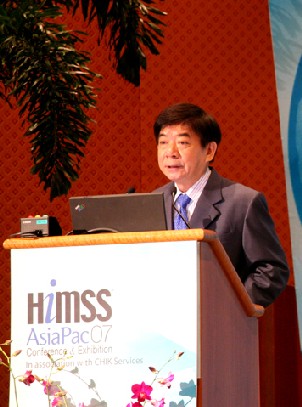Healthcare must step up IT adoption

SINGAPORE--Electronic medical records (EMR) may be a reality in some parts of the world today, but the healthcare sector would do well to adopt more information technologies so as to provide quality patient care.
 Singapore's Minister of Health Khaw Boon Wan calls for a transformation of healthcare delivery using technology |
Speaking at the opening of the first Healthcare Information and Management Systems Society (HIMSS) AsiaPac 2007 conference here Wednesday, Singapore's Minister for Health Khaw Boon Wan drove home the message that IT holds the key to containing rising healthcare costs and, at the same time, ensuing quality healthcare.
"We all say that healthcare providers should treat patients holistically as a team, share information about the patients and partner one another to bring care to the patients, without duplicating efforts or replicating tests.
"Yet, the reality is quite different," Khaw said. "Relatively few doctors, clinics and hospitals in the world consistently practise pro-active prevention regimes. Many chronically-ill are not receiving appropriate care at the appropriate level, and continue to be treated in more expensive tertiary settings unnecessarily."
"Seamless, integrated care for patients across the whole healthcare ecosystem remains like the Holy Grail--widely sought by many, but still a distant, seemingly unattainable goal," he added.
The minister called for greater adoption of IT, noting that the healthcare sector was a laggard compared to the high-tech manufacturing and financial services industries. "Healthcare, unfortunately, remains many steps behind other sectors," he said.
Although the healthcare sector has made progress--for example, EMR is no longer just a concept but a reality in many healthcare institutions worldwide--he noted that the challenge now is to take things to the next level. Khaw said: "Where healthcare delivery is truly integrated nationally, between primary-tertiary step-down care, and between public and private sector institutions."
To achieve this, he added, several issues will have to be addressed. These include interoperability and data exchange, which require establishing data and systems standards and ensuring that they are widely adopted, as well as system security, data protection, privacy regulation and audit.
"Difficult though these issues may be, however, we can take heart that other industries have faced the same issues and have successfully overcome them. It can be done," he said.
Photo Gallery More from the conference: |
Noting that Singapore is well into this journey, Khaw highlighted the importance of the next step in transforming healthcare in the island-state.
"Our next major steps are to set national data and IT standards and to put in place the legislative framework for data protection. These will provide the foundation on which we will build a national electronic health records database containing critical health records of every Singaporean," he said.
Earlier this year, Khaw's ministry announced plans to introduce an EMR system, with a goal to have all healthcare institutions--public and private--linked to the centralized database. "We will have to make these records [available] online and accessible, providing real-time clinical information of the patients [healthcare service providers] are treating... Otherwise, any talk about patient-centric healthcare will never happen," the minister said.
Khaw's call for greater IT adoption echoed throughout the conference.
Professor Tan Ser Kiat, group CEO of Singapore Health Services and CEO at Singapore General Hospital, noted in his keynote speech that "healthcare IT has taken a long, painful and slow journey" and "lags behind industries like aviation and retail".
However, Tan cited several examples of encouraging signs of progress, such as Changi General Hospital's recent pilot of the Mobile Clinical Assistant in its Accident & Emergency department.
Singapore, Tan said, is "relatively advanced in adopting IT because we're smaller and therefore, [it's] easier for us to implement".
On what will come next for the healthcare industry, he said that "interactive intelligence" is the future, where it goes beyond information archival. "The system will prompt and help the healthcare professional perform his or her job better," he explained.
Tan's wish is to have this implemented "yesterday", but he acknowledged that challenges such as IT costs and finding the right talent remain. "The sooner we have it, the better. We are constrained by talent and cost," he said.
Tan also highlighted new possibilities when electronic healthcare records are integrated with other useful databases. He demonstrated an EMR application that is currently piloted at Singapore General Hospital, where doctors need only to click on an icon in the e-healthcare record to access internationally-recognized evidence-based medical databases such as OVID and Cochrane Collaboration. The benefit is significant, he added, as doctors and nurses can gain more information on a particular illness and be guided to find the right treatment by gaining instant access to these reference sites while attending to a patient.
The HIMSS AsiaPac 2007 conference and exhibition officially opened today and ends May 18. Over 50 industry thought leaders from across the globe, including Malaysia, China, Australia, Japan, Korea, New Zealand and the United States, will be speaking on various industry issues and sharing case studies. About 1,000 industry professionals and policymakers are expected to attend.